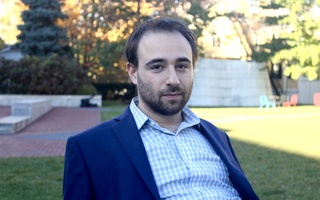Former President of Tunisia Moncef Marzouki discussed the ideological differences that led to the Arab Spring and the importance of democracy and the fight against corruption in an event at the Kennedy School on Tuesday night.
Before his election to office in 2011, Marzouki taught community medicine and established himself as a prominent human rights and anti-child abuse activist in Tunisia.
On Tuesday, Marzouki sharply condemned the corrupt dictatorships that led to civil unrest in the Arab Spring uprisings, including Tunisia’s own revolution that lasted from Dec. 2010 to Jan. 2011.
“It’s striking to see that no leaders or supporters of the dictatorship have expressed regret or apologized,” he said.
Marzouki spoke at length about diplomacy between Western and Middle Eastern countries in his talk, and said he thinks some governments have “provided unconditional support to the regime in place, regardless of their human rights records.”
He said that he found many Western countries’ commitments to democracy unclear.
“To them, a stable regime—fighting terrorism, protecting borders from illegal immigration, and opening markets to Western influence—is the ideal regime and it does not matter if it is corrupt,” Marzouki said.
He then spoke of the consequences of the Tunisian Revolution, saying that he found changing a government from a dictatorship to a democracy “is the most complicated and difficult thing in the world.” Marzouki oversaw the country’s transition to democracy after he assumed office shortly after the revolution.
Marzouki said that the homogenous population of Tunisia aided their transition into a democracy in his term as president.
“Ninety percent of our society is comprised of Arab Muslim Sunnis… The middle class represents a large proportion of society. Our military is professional, and has no history of encroachment of economic or political activities,” he said. “Our civil society is very strong, vigilant, responsible, flexible, and peaceful.”
He added that reaching a political consensus is much less likely in countries like Libya, Egypt, and Yemen with more diverse populations or with a “military institution deeply involved in politics and economy and corruption.”
Overall, Marzouki said he thinks Tunisians can be “proud” of the progress they have made in creating a democratic government.
“We have proven that Islam and Democracy are compatible. Secularists and Islamists can work together,” he said.
Read more in News
Cambridge Residents Worried &pizza Will Detract from SquareRecommended Articles
-
What is Going on TodayLast day for 1913 to hand in applications for space in the Yard for Class Day Spreads. 10.30.--President and Fellows
-
FOURTH OF GODKIN LECTURES"Direct versus Representative Government" will be the subject of the fourth of the Godkin Lectures on "Democracy and Responsibility" to
-
Review of Current MonthlyThe October Monthly gives fresh evidence that the editors are no longer consecrated either to pure literature or to impure
-
MANY SHOWED INTEREST IN SOCIAL SERVICEOne hundred and seventy-five men attended the social service conference in the Phillips Brooks House last night. W. Willcox, Jr.,
-
 'Intellectual Powerhouse': Yascha Mounk Examines the Future of Democracy
'Intellectual Powerhouse': Yascha Mounk Examines the Future of Democracy













